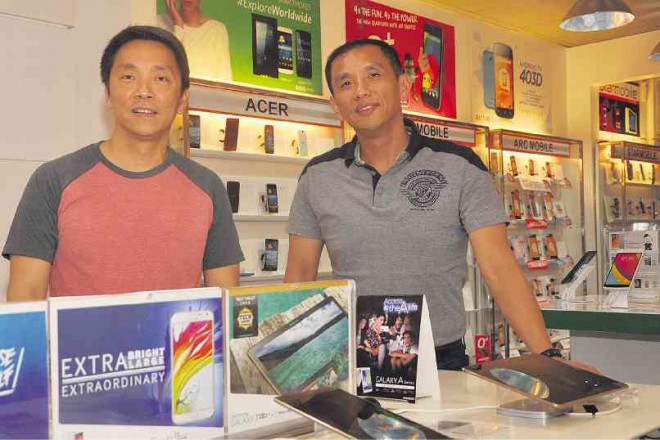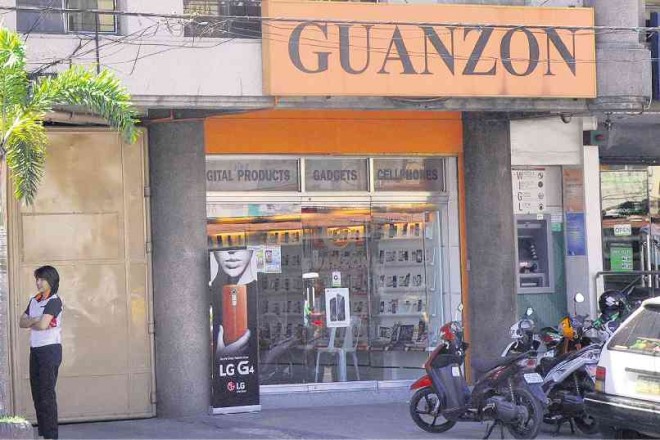Dagupan hardware rises from war, quake
For two days in 1990, businessman Joseph Lo cried. After a powerful earthquake crushed the family-owned Guanzon Hardware and almost flattened the coastal city of Dagupan, he could not imagine how their business would ever recover.
“We almost surrendered then because ours was not just a store; that was our house. Our building sank by a meter. We had no water, no electricity. It was a time when everybody wanted to leave Dagupan,” says Lo, who was then helping his parents run the store.
But he would soon realize that behind the disaster lurked an opportunity. He decided to rebuild the store, which also sold motorcycles, and asked suppliers for a one-year moratorium on the payment of debts.
Lo did not regret the move. Today, the small outlet has become the Guanzon Group of Companies, with 140 branches nationwide selling mobile phones, motorcycles and even cars.
This year, the company celebrated its 70th anniversary.
Article continues after this advertisementArticle continues after this advertisement
Hard work
Lo says the family enterprise has reached this far because of the hard work of his father, Guan Kai Lo, which dated back to the pre-World War II era and its investment on its workers. The elder Lo was among the early Chinese migrants in Pangasinan, settling in Dagupan before the war when he was only 17.
“During the war, he traded live hogs with American soldiers. He bartered these with whiskey and canned goods. But because you could not sell these, my father was once arrested by American MPs (military policemen) in Rosales [town] for selling the goods,” Lo says.
It was in Dagupan where Guan Kai Lo met his wife, Pacita Garcia, who was escaping the harsh living conditions in her native Pampanga province during the war.
“After the war in 1945, my father sold almost anything. In one of his visits to Manila, he saw one store named Guanzon, which was teeming with customers. He thought it rhymed with his name. When he came home, he put up a sign and Guanzon Hardware was born,” he says.
The store, which was put up in a rented lot in the city’s business center, started selling “kalesa” (horse-drawn carriage) parts, then bicycles and eventually motorcycles.
“When I was in my teens, we were still selling everything—nails, ‘gulaman’ (gelatin), ‘supot’ (paper bags), radio—it was a sari-sari store,” Lo, 49, says.
Before the 1990 earthquake, Lo opened a store branch in San Fernando City in La Union province after a series of discussions with his father. “My father was quite apprehensive then because I am not a businessman,” says Lo, a civil engineer.
Siblings take over
With the expanding business after the temblor and with the family’s acquisition of a Honda motorcycle dealership in the province in 1993, Lo and his younger brother, Guanson, a medical technologist, formally took over management of the business.
Lo became company president while his brother, vice president. As both of their parents have died, the older siblings—Jane Ong, Debbie Cristobal and Vicky Co—are board directors.
With more than 1,000 employees distributed in its branches, Lo says the firm’s primary challenge was human resources.
“As you go farther away from your home base, your human resources gets weaker because there’s no system for the motorcycle business. Unlike in the hotel business, you can buy a software to run a hotel,” he says.
“If I go to Mindanao for example, I will be hiring strangers. And efficiency is affected because in every system, trust should be incorporated.”
Homegrown
Lo says 90 percent of the workers are homegrown managers. “You cannot just send them farther away because Filipinos always want to be with their families,” he says.
Guanson attributes the success of the company to the employees.
“Our employees make the company. There are many businessmen, you can look around Dagupan, and they are big, but they don’t know how to expand because they don’t know how to let go of their authority,” he says.
The nine-member executive committee (execom) makes the big decisions. “In that body, only Guanson, I and a cousin are blood-related. The rest are our trusted people. If Guanson and I cannot agree on something, we bring it to the execom for decision,” says Lo.
Once a decision is made, Guanson implements it. “I detach myself so there will only be one boss. We do not want our associates to forum-shop between us,” Lo says.

THE LO BROTHERS, Guanson (left) and Joseph, run the Guanzon Group of Companies, a Dagupan City-based family enterprise that has expanded into 140 branches around the country.
Everybody’s boss
Guanson, as vice president, is everybody’s boss. “They should all go to him. If they want to come to me, Guanson should be around, listening,” Lo says.
On the company’s 70th year, Lo’s wish is to see his children and those of his siblings running the company in the future. “We wish, but we cannot impose. It’s a democratic country. But with so many of them around I’m sure someone will take over later,” he says.
Guanson expresses the same hope. “If not, we can follow in the footsteps of Honda, who did not allow any family member to run the company. That is possible but we’re not saying that we’ll going to follow that kind of management,” he says.
A nephew, who finished a business management course, began working for the company two years ago.
“He started from the bottom. He should be able to show that we can work. You cannot start as a boss because you have just graduated. You have to understand first the employees before you understand the business,” Guanson says.
As soon as his children join the business, Lo wants to retire early.
“I’m not retiring from work but I will retire from Guanzon and move into something else. I do not want to die making money,” Lo says.
He says he will spend his time supporting the Caring for the Future Foundation, an orphanage in Sual town.
